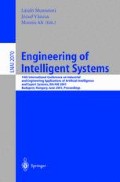Abstract
We present a method for inducing a set of rules from time series data, which is originated from a monitored process. The proposed method is called MAPS (Mining Aberrant Patterns in Sequences) and it may be used in decision support or in control to identify faulty system states. It consists of four parts: training, identification, event mining and prediction. In order to improve the flexibility of the event identification, we employ fuzzy sets and propose a method that extracts membership functions from statistical measures of the time series. The proposed approach integrates fuzzy logic and event mining in a seamless way. Some of the existing event mining algorithms have been modi- fied to accommodate the need of discovering fuzzy event patterns.
Access this chapter
Tax calculation will be finalised at checkout
Purchases are for personal use only
Preview
Unable to display preview. Download preview PDF.
References
Rakesh Agrawal, Ramakrishnan Srikant: Mining Sequential Patterns. In Proceedings of the Eleventh IEEE International Conference on Data Engineering (ICDE’95), pp. 3–14, March 6-10, 1995, Taipei, Taiwan.
Claudio Bettini, Xiaoyang Sean Wang, Sushil Jajodia, Jia-Ling Lin: Discovering Frequent Event Patterns with Multiple Granularities in Time Sequences. IEEE Transactions on Knowledge and Data Engineering (TKDE) 10(2): 222–237 (1998)
Thomas G. Dietterich and Ryszard S. Michalski: Discovering Patterns in Sequences of Events. Artificial Intelligence 25(2): 187–232 (1985).
Tom Fawcett, Foster J. Provost: Activity Monitoring: Noticing Interesting Changes in Behavior. In Proceedings of the Fifth ACM SIGKDD International Conference on Knowledge Discovery and Data Mining (KDD’99), pp. 53–62, August 15-18, 1999, San Diego, CA, USA.
Valery Guralnik, Jaideep Srivastava: Event Detection from Time Series Data. In Proceedings of the Fifth ACM SIGKDD International Conference on Knowledge Discovery and Data Mining (KDD’99), pp. 33–42, August 15-18, 1999, San Diego, CA, USA.
Philip Laird: Identifying and Using Patterns in Sequential Data. In Proceedings of the Fourth International Workshop on Algorithmic Learning Theory (ALT’93), LNCS 744, pp. 1–18, Tokyo, Japan, November 8-10, 1993.
Jianxiong Luo, Susan M. Bridges: Mining fuzzy association rules and fuzzy frequency episodes for intrusion detection. International Journal of Intelligent Systems (IJIS), 15(8): 687–703 (2000).
Heikki Mannila, Hannu Toivonen, A. Inkeri Verkamo: Discovery of Frequent Episodes in Event Sequences. Data Mining and Knowledge Discovery 1(3): 259–289 (1997)
Author information
Authors and Affiliations
Editor information
Editors and Affiliations
Rights and permissions
Copyright information
© 2001 Springer-Verlag Berlin Heidelberg
About this paper
Cite this paper
Kotsakis, E., Wolski, A. (2001). MAPS: A Method for Identifying and Predicting Aberrant Behavior in Time Series. In: Monostori, L., Váncza, J., Ali, M. (eds) Engineering of Intelligent Systems. IEA/AIE 2001. Lecture Notes in Computer Science(), vol 2070. Springer, Berlin, Heidelberg. https://doi.org/10.1007/3-540-45517-5_35
Download citation
DOI: https://doi.org/10.1007/3-540-45517-5_35
Published:
Publisher Name: Springer, Berlin, Heidelberg
Print ISBN: 978-3-540-42219-8
Online ISBN: 978-3-540-45517-2
eBook Packages: Springer Book Archive

